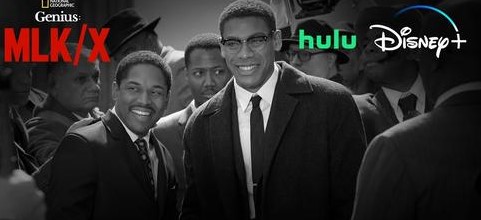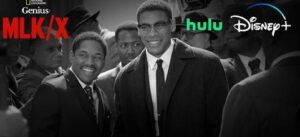Movie Info
Movie Notes
It was almost two weeks ago that I watched and posted on my blog that I would be posting my review of the new Genius series. An out of town trip and being laid up with a bad case of flu has delayed my plans, but here at last is the review of the first four episodes, to be followed next week by the others. In the Feb. VP I hope to be able to include some discussion questions.
Movie Info
- Director
- Based on Jeff Stetson's play
VP Content Ratings
- Violence
- 2/10
- Language
- 1/10
- Sex & Nudity
- 2/10
- Star Rating
Relevant Quotes
Then the Lord said, “I have observed the misery of my people who are in Egypt; I have heard their cry on account of their taskmasters. Indeed, I know their sufferings, and I have come down to deliver them from the Egyptians and to bring them up out of that land to a good and spacious land, to a land flowing with milk and honey…
The Lord sets the prisoners free;
the Lord opens the eyes of the blind.
The Lord lifts up those who are bowed down;
the Lord loves the righteous.
Not Rated : 8 Episodes c. 50+ minutes
The 4th Season on PBS of National Geographic’s Genius series, Genius: MLK/X, provides an inspiring account of the lives of last century’s two great civil rights leaders, Dr. Martin Luther King, Jr. and Malcolm X. It’s the most thrilling of all the films I have seen about the two, veering back and forth to each with more details about their private and public lives than I have ever seen. I was riveted to the screen for every single second of the 8-part series, and I think you will be too. The first episode premiered on February 1 and will afterwards stream on Disney+ and Hulu, with two new episodes debuting weekly on all platforms.
To many the two leaders were at opposite poles, Malcolm X demanding the right of Blacks to form their own society and to use force for defense, whereas Martin Luther King, Jr. sought a multi-racial society that could be achieved by nonviolence. And yet, as you will see at the end of the last episode, the two widows realized they had a great deal in common, beginning with a mutual respect for one another, The drama series perform a marvelous service by allowing us to watch their development from childhood to grown men who, though they did not live into their forties, had a huge impact upon our lives.
The ensemble cast includes Kelvin Harrison Jr. (The Trial of the Chicago 7) as Dr. Martin Luther King Jr., Aaron Pierre (The Underground Railroad) as Malcolm X, Weruche Opia (I May Destroy You) as Coretta Scott King, and Jayme Lawson (The Batman) as Betty Shabazz. The series also marks one of the last roles for Emmy-winning actor Ron Cephas Jones (This is Us).
Episodes:
S4.E1 MLK/X: Graduation
Gov. George Wallace gets the first word –his infamous “Segregation now, Segregation Forever!”—and then we see both African American leaders being helped by their wives as they dress. In Washington DC the two, surrounded by the press, meet as they smile and shake hands. The opening title and credits are followed by current and past scenes in the two men’s lives. In Malcolm’s childhood up North a Black Nationalist speaker talks about the need to go back to Africa, whereas Daddy King preaches the opposite in Atlanta–that Blacks will not return to Africa. During dinner he announces that he is changing his and his son’s names to Martin Luther. (This is done with no reference in the script that it was after a visit to Germany where he was impressed by reformer Martin Luther that he decided to do so.)
The differences in their growing up experiences are well shown by cutting between Daddy King and his son in their nice car and Malcolm and his father in a dilapidated truck. Rev. King thrives as pastor in Atlanta, whereas young Malcolm’s strong-willed father is murdered for his outspokeness. Seven years later Malcolm is a bright student, but when he says he wants to be a lawyer, his classmates laugh at him, and his teacher advises him to learn a trade. His mentally troubled mother is taken away. Years later, known as “Red,” Malcolm becomes a petty criminal, landing in prison, where eventually his brother visits him, leading him to clean up his act when he converts to the Nation of Islam. He develops into quite a public speaker, even taking on the Princeton Debate Team over the racism when the latter visit the prison.
On the other hand, after a short bout of mental instability following the death of his beloved grandmother, teenage Martin also develops into a speaker at a contest about the Constitution. He quickly learns how it does not apply to him when he is made to give up his seat on a bus. Up at his Boston school he forms a discussion group with several fellow students. He also meets a beautiful singer Coretta Scott, with whom he becomes smitten. During a date she informs him she is bent on a career, not marriage.
Appropriate to its title, the episode ends with Malcolm being released from prison, to accompany his brother to Chicago to meet Elijah Mohammad, head of the Nation of Islam, and Martin graduating from Boston University with a PhD..
Thus, they begin their respective journeys that will one day change the nation and cause them to clash. The episode is good at showing us personal details of the two men, but I wish it had shown a little more of their intellectual development—especially of Martin’s introduction during his seminary studies to Gandhi and his ideas. (Boston University is shown, where he earned his PhD, but I don’t recall any mention of his years at Morehouse College where he was impressed by Henry David Thoreau’s “Essay on Civil Disobedience” or his time at Crozer Theological Seminary where he learned about Gandhi.) This lack does not whet my enthusiasm for the series; it just serves as a reminder that there will be a lot of interesting facts that not even an eight-part series is able to cover.
S4.E2 ∙ MLK/X: Who We Are
The Honorable Elijah Muhammad, impressed by Malcolm, takes a special interest in him, seeing the young man’s leadership potential for the Nation of Islam (NoI). Malcolm’s love for an old flame is an obstacle to advancement, as is his loyalty to his brother whom Elijah Mohammad accuses of immoral conduct.
Martin woos and brings Coretta to the King family home in Atalanta, but Daddy King is very cool to her, reminding his son of a previous girl friend. He clearly wants young Martin to join his staff, but the son wants to find his own voice way from his father’s shadow. Martin and Coretta almost part ways. There is mention of a church in Montgomery where his father has been invited to preach. Coretta too must decide about a career versus becoming a minister’s wife—she has won a role in an opera that is scheduled to go on tour. Martin agrees to go to Montgomery and finds there his calling. Coretta chooses Martin, and the two are wed—but not before her demand that their wedding vows b changed, she expecting to be an equal partner.
In Harlem Malcolm has to deliver the bad news to his brother that he is replacing him as minister of the mosque because of his bad conduct. Thus, both men end the episode by showing who he is, true to its title.
S4.E3 ∙ MLK/X: Protect Us
The Montgomery Bus Boycott begins shortly after the Kings move into their new church. With phone threats, Martin is given a towel, wrapped around a gun.
Malcolm speaks forcibly to Muslims in the Harlem community, meeting new member Betty Saunders, As their romance progresses, a brother is beaten and carted off to jail by the police. Malcolm walks into the police statio to confront the brutal officer who speak disdainfully to him. The cop changes his tune when Malcolm nods to a large contingent of Black Muslims standing in rows in front of the police station. He marvels at such power—in black hands. The badly injured brother is taken away in an ambulance.
Veteran activist Bayard Rustin joins Martin, helping him see the larger picture of what Martin thinks is just a local struggle—and teaching that nonviolence is not a tactic but way of life. As the struggle escalates, the King’s home is bombed. Daddy King wants the family to move to Atlanta out of harm’s way, but Coretta also defends their decision to remain. Rustin teaches the Blacks to overcome their fear of jail. After tumultuous events, Rustin shows up at the King’s home with a copy of TIME Magazine—MLK is on the cover.
Malcolm X becomes increasingly active in Harlem, rising to become the official spokesman for the NoI. But he faces his first conflict with Elijah Mohammad when he takes action without consulting him. He proposes to Betty over the telephone, and she accepts. He too sees the TIME cover with Dr. King on the cover.
S4.E4 ∙ MLK/X: Watch the Throne
At a book signing in Harlem a deranged woman stabs Martin, but he recovers.
Malcolm deplanes at Idlewild from his journey to Africa—whether this was his haji to Meccah or a later 1964 trip is not made clear. It is too bad no details of the trip—which, as both his autobiographic book and film Malcolm X make clear, led to his recognition that not all whites were white devils—but you can see this in the book.
This episode is stuffed with exciting events, including Congressman Adam Clayton Powell’s charge that Rustin and King are lovers, details of Betty’s growing discontent as a Muslim wife supposed to meekly accept the rule of her husband, Malcolm becoming involved in a TV documentary on the NoI that backfires on his intent to present a more positive face of the much criticized group, and Bayard sadly parting ways with Martin.
Dr. King, reluctant to join in student direct action desegregation efforts, finds himself under pressure from younger activists, and the rift between Elijah Mohammad and Malcolm grows.
There is so much in each episode that I want to return to the series for a second viewing to catch what I missed the first time. All four of the above summaries leave out so much! The switching back and forth between the lives of the two men—and their wives—really does bring out the many things they had in common. And I do mean to include the wives—never before has the contribution of each woman to the ministry of her husband been as well portrayed. More on his in the next issue when I summarize the second half of the series.


